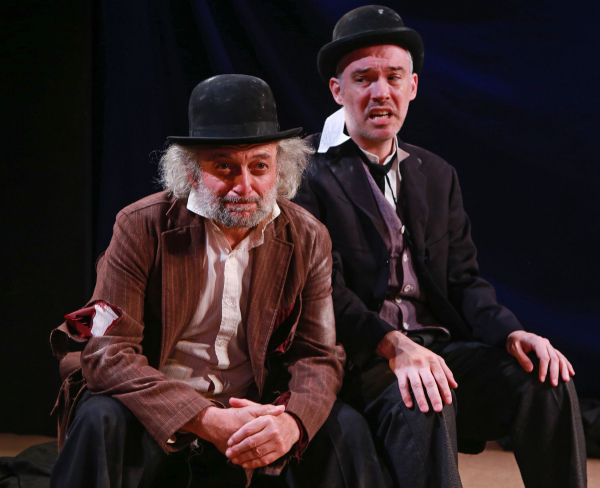Waiting for Godot

(© Ronald L. Glassman)
The Castillo Theater and The New Yiddish Rep's currently running production of Samuel Beckett's Waiting for Godot marks the first time this famous play has been produced in Yiddish. In addition to being one of the most well-known absurdist plays, Godot, which has been translated into over 20 languages in its 60-year history, is also required reading for theater-studies students around the world. But the question that begs to be asked in this production is, why Yiddish? The answer comes in this simple but well-honed staging helmed by Moshe Yassur and starring David Mandelbaum and Shane Baker.
The skill that Baker (who also wrote the translation) and Mandelbaum display while performing in a language that is not their first is impressive. Together, these two use their acting skills to make the text feel accessible, falling into their characters with delightful abandon, using the sparse stage space to alternate between silly vaudevillian physical gags and the empty, all-too-real emotional lows of being adrift in a world that has nothing to offer.
The play's sad resonance is brought even more to the forefront by Yassur's choice to make its central characters Holocaust survivors, a key piece of information audience members know only if they read the program notes, since the play's drama is so removed from any contextual clues. However, for the informed viewer, this incredibly fitting choice offers another convincing justification for the play. Set just after the Second World War, it highlights the period in which Beckett was writing and the situations that may have affected him. This element also helps lend more resonance to lines such as "I can't go on, I'll go on." Yiddish grounds the play in the particular time and with a language that would have been more familiar to ears of that period. It also acts as a time capsule, preserving the history, religion, and culture of a shrinking generation of survivors.
New Yiddish Rep's goal is, in part, to give new generations "a relationship with the past and significance in the present" and make Yiddish theater "known to a larger audience, outside of its cultural boundaries." When it comes to that latter part of the mission, Waiting for Godot stretches "the cultural boundaries" by making an already not easily accessible story even more difficult to grasp by setting it in a wholly unfamiliar language. But for the already initiated (either to Beckett or to Yiddish and especially to both), this Yiddish production of Godot will be particularly resonant.










